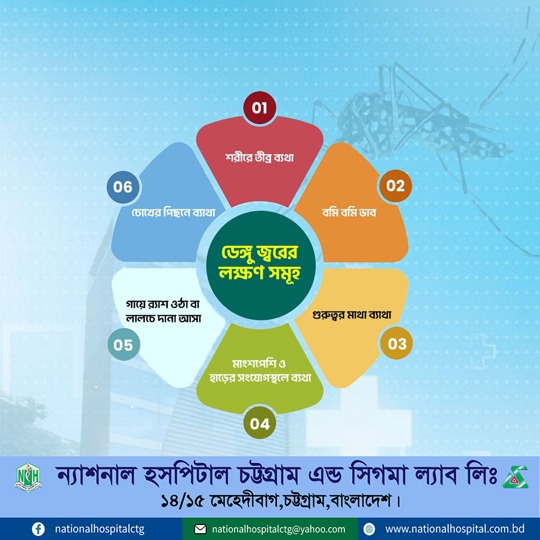Dengue Fever Symptoms and Treatment

Dengue fever is a prevalent mosquito-borne viral illness affecting millions worldwide. The Aedes aegypti mosquito primarily transmits dengue fever, caused by four closely related dengue virus serotypes. This blog post will explore the symptoms, available treatments, and preventive measures for dengue fever.
Symptoms of Dengue Fever in Bangladesh
Dengue fever typically presents symptoms that emerge 3 to 14 days after being bitten by an infected mosquito. The most common manifestations include a sudden onset of high fever, often exceeding 104°F (40°C). Intense headaches, primarily located behind the eyes, are frequently experienced, along with pain, redness, or swelling in that area. Excruciating joint and muscle pain is another hallmark symptom of dengue fever. Fatigue and exhaustion are prevalent during the acute phase of the illness, and individuals may also suffer from nausea and vomiting. A skin rash may develop 2 to 5 days after the fever begins. Also, mild bleeding may occur, such as nosebleeds, bleeding gums, or easy bruising. It's essential to recognize that dengue symptoms can vary from mild to severe.
Dengue Test Price in Bangladesh
To diagnose dengue fever, a medical professional may order a dengue test. In Bangladesh, Government hospitals commonly use the NS1 test for dengue, and they have fixed the cost at Tk 100. Private hospitals, on the other hand, may charge up to Tk 300 for the NS1 test. The NS1 test detects the presence of the dengue virus antigen in the blood and helps confirm the diagnosis.
Treatment for Dengue Fever in Bangladesh
Treatment for dengue fever involves managing symptoms and supporting the patient's recovery, as no specific antiviral therapy is available. Adequate fluid intake, including intravenous fluids if necessary, is crucial for maintaining hydration and electrolyte balance, particularly in patients with severe symptoms. Acetaminophen (paracetamol) can achieve fever and pain relief while avoiding non-steroidal anti-inflammatory drugs (NSAIDs) like ibuprofen and aspirin are advised to minimize the risk of bleeding. Sufficient rest is essential to promote recovery and reduce the chances of complications. Hospitalized dengue patients require close medical observation, careful monitoring of fluid intake and vital signs. A blood transfusion may be necessary to address low platelet count and excessive bleeding in severe hemorrhagic complications.
National Hospital provides Dengue Tests and Treatment
At National Hospital Chattogram, patients can avail themselves of various diagnostic tests, including CBC, SGPT, S.Electrolyte, and Dengue test. The hospital provides expert medical advice and personalized treatment for dengue fever, focusing on symptom management and supportive care. Close monitoring, intravenous fluid administration, and pain relief measures, such as acetaminophen, ensure proper hydration and electrolyte balance and alleviate symptoms. National Hospital Chattogram dedicates itself to providing comprehensive care and aiding patients in their recovery from dengue fever.
Prevention and Dengue Vaccine
Experts recommend actively using mosquito repellents containing DEET on exposed skin to prevent mosquito bites and wearing long-sleeved shirts and long pants to minimize skin exposure. Additionally, using mosquito nets while sleeping, particularly during the daytime when the Aedes mosquito is most active, can provide further protection. Eliminating mosquito breeding sites by emptying stagnant water containers and maintaining clean surroundings is vital to disrupt the mosquito life cycle. Vaccination against dengue is available for individuals aged 9-45 who have previously had dengue, offering protection against future infections. Ongoing research evaluates additional vaccine candidates to expand preventive measures against dengue fever. By implementing these preventive strategies, we can significantly reduce the incidence of dengue and protect ourselves from this mosquito-borne disease.
Dengue fever is a significant public health concern, particularly in areas where the Aedes mosquito is prevalent. Recognizing the symptoms of dengue fever, such as high fever, severe headaches, joint and muscle pain, and rash, is crucial for early detection and timely medical intervention. While no specific antiviral treatment for dengue exists, supportive care, including hydration, pain relief, and rest, can help manage the symptoms and promote recovery. Prevention through mosquito bite prevention measures, such as using repellents and eliminating breeding sites, is essential in reducing the incidence of dengue fever. Vaccination is available for specific age groups and can protect against future dengue infections. By staying informed and taking preventive measures, we can collectively combat the spread of dengue fever and minimize its impact on public health.
